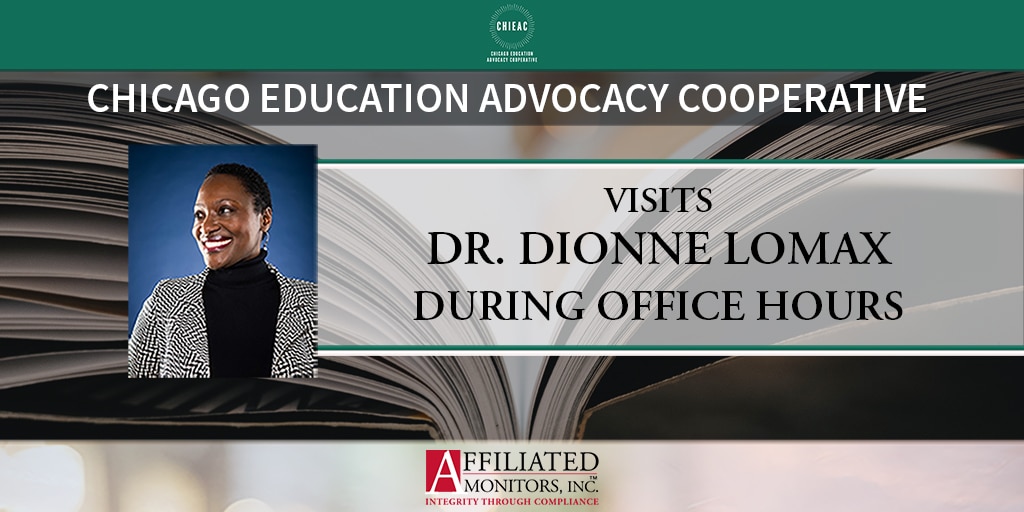
The Chicago Education Advocacy Cooperative started in early 2020 with the hopes of supporting racialized and minoritized students as they attempt to navigate Predominantly White Institutions (PWIs). CHIEAC aims to ensure equitable access to high-quality education for all, regardless of status and identity, through the supply of support services and commitment to proactive advocacy including educator assistance, education advocacy, and student coaching.
They sat down with AMI’s Dionne Lomax during her office hours at BU’s Questrom School of Business. Read their conversation below.
Can you tell us about your subject/specialty?
I wear several hats at Boston University. I am a Lecturer at the Questrom School of Business where I teach a business law course called, “Introduction to Law.” I also serve as a Lecturer at the Boston University School of Law. At the law school I co-teach a “Healthcare Competition” seminar (focused on the intersection of competition and the health care industry), as well as a “Big Law Seminar” (focused on helping law students prepare for practicing law at a law firm). Separate and apart from that, I also serve as Managing Director of Antitrust and Trade Regulation at Affiliated Monitors, Inc. At AMI I use my antitrust expertise to help various companies develop antitrust compliance programs or monitor a company’s adherence to a government order requiring compliance with various aspects of the U.S. antitrust laws.
Prior to joining B.U. I represented high-profile clients in various commercial transactions across a wide range of industries for over 20 years. I was a Partner in the Washington, D.C. office of Mintz Levin, where my antitrust work included representing large health systems, major medical associations, large multi-specialty physician groups, pharmaceutical companies, and medical device manufacturers in connection with mergers and acquisitions, joint ventures, and other commercial arrangements. I was also a Partner in the Washington, D.C. office of Vinson & Elkins LLP, where I represented clients before the U.S. Department of Justice, Federal Trade Commission, and various State Attorneys General in connection with mergers and other commercial transactions in a number of industries, including health care, energy, chemical products, investment management (e.g., private equity), and technology (e.g., computers, semiconductors, software).
During my years as a practicing attorney, I have been privy to how laws and regulations impact strategic business decisions. I have witnessed the significant increase in litigation and regulation to which businesses are subjected. I believe that the rise in regulation makes it imperative that the next generation of business professionals understand the nature of the legal system, its role and influence on business operations, and how it impacts business decision making. My teaching philosophy is to promote student enthusiasm for the law by ensuring that students experience the practical application of a subject with a special emphasis on providing students skills-based simulation exercises as they analyze relevant issues.
What does your day-to-day look like?
During the school year my day-to-day often involves spending considerable time preparing lectures for class. Because my teaching philosophy largely focuses on practical application, I spend a significant amount of time researching legal cases, reviewing Law Review articles and other publications for real-life scenarios I can use in class as an illustration for my students. In many instances, the articles and research are organized into true/false or multiple choice hypotheticals that I can use during class to further facilitate student learning and comprehension. On days when I also have commitments for my position at AMI, I can spend time reviewing a Proposed Final Judgment or similar Order from a court of law in connection with a monitoring engagement I am spearheading. Finally, I also serve as a Vice Chair of Education for the Antitrust Practice Group at the American Health Law Association. As such, at times, part of my day involves coordinating webinars and other educational programming to help keep health care industry participants informed about important developments related to competition law.
What’s something you want people to know about your subject?
I want people to understand how the law and risk management can impact various aspects of a business enterprise. Often, business executives think that they should leave the law to the lawyers. Leaving the law and legal issues solely in the hands of attorneys is not the best way for a business enterprise to manage its risk. Instead, business executives should embrace a partnership with lawyers in order to help minimize and manage the various risks faced by the business. For example, many executives view the law as a tool to help companies stay out of trouble. Although most business executives and companies want to stay on the right side of the law, at the same time, they often view the law and legal regulations as a roadblock to their strategic objectives. When I was in private practice one of my clients would “jokingly” advise me to be careful about how I approached providing legal advice to the company’s business executives, because the executives collectively, viewed lawyers and the legal department as the place where proposed transactions and strategic business plans go to die. However, when considered holistically and from the right perspective, the law can serve many purposes for a global enterprise, including benefitting a company by helping it achieve its short-term and long-term goals and objectives.
What advice do you have for students?
I often encourage students to choose a career by figuring out not only what they are good at technically and intellectually, but what they would enjoy doing on a daily basis. By doing that, they put themselves in the best position to choose a career that excites them and one that they will look forward to engaging in each day.



